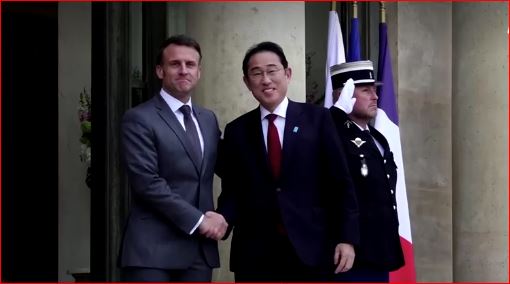PARIS: France and Japan agreed on Thursday to start formal talks on a reciprocal troop access deal, strengthening military cooperation.
The G7 allies have held numerous joint military exercises in recent years, bilaterally and as part of a wider group. Paris has been pushing for more than a year to begin talks on a reciprocal access agreement (RAA).
RAAs create frameworks to facilitate military cooperation, easing the entry of visiting forces and equipment.
“They agreed to start negotiations,” a Japanese government official said, as Prime Minister Fumio Kishida and President Emmanuel Macron met in Paris. “Given the accumulation of cooperation and (military) exercises, we consider this important.”
A Japanese government statement confirmed the agreement to initiate talks. The French presidency said the RAA would promote interoperability between the two militaries.
In December 2023, Japan announced its biggest military build-up since World War II. It has already signed RAAs with Australia and the United Kingdom and is negotiating one with the Philippines.
Japan also hosts the biggest concentration of U.S. forces abroad. A Japanese official said the deal with France could take about a year to conclude. A French diplomatic source said Paris hoped it could be done “very quickly.”
Japan has sought to strengthen defence ties amid concerns about China, including its pressure on Taiwan, freedom of navigation in the region and trade disputes. It has also backed Ukraine in its war against Russia.
“We see what’s happening in Europe and the Indo-Pacific as inseparable,” the Japanese official said.
France has territories in the Indo-Pacific and stations armed forces in the region. It also wants to play a bigger role in Japan’s defence industry, as it has in the civilian nuclear power sector.
(REUTERS)
In a career spanning three decades and counting, Ramananda (Ram to his friends) has been the foreign editor of The Telegraph, Outlook Magazine and the New Indian Express. He helped set up rediff.com’s editorial operations in San Jose and New York, helmed sify.com, and was the founder editor of India.com.
His work has featured in national and international publications like the Al Jazeera Centre for Studies, Global Times and Ashahi Shimbun. But his one constant over all these years, he says, has been the attempt to understand rising India’s place in the world.
He can rustle up a mean salad, his oil-less pepper chicken is to die for, and all it takes is some beer and rhythm and blues to rock his soul.
Talk to him about foreign and strategic affairs, media, South Asia, China, and of course India.





